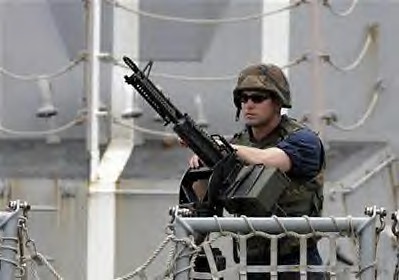
A U.S sailor stands on guard on the deck of the warship Bainbridge upon arrival at the port of Mombasa, Kenya, 500km from the capital Nairobi, April 16, 2009., a photo by Pan-African News Wire File Photos on Flickr.
Al Shabaab: Kenya’s curse
Monday, 16 July 2012 12:07
Henry Makori
Reprinted From the Zimbabwe Herald
Kenya is still in shock after hooded gunmen opened fire and lobbed explosives into two churches recently in Garissa, north-east of the country, killing 17 worshippers and injuring over 60 others.
The attacks occurred shortly after 10am as prayer services were in progress at the African Inland Church (AIC) and the Catholic cathedral in the town. All 17 deaths occurred in the AIC church.
The government announced it was sending 700 more police officers to the area to beef up security. Senior police officers and government administrators were transferred — without any explanation as to how that would improve security for the residents.
Kenya at the weekend was a veritable police state. Officers mounted security checks at most churches in towns around the country, frisking worshippers before they entered.
Church leaders had castigated the government for not taking security around churches seriously. The twin attack has been attributed to the armed Somali Islamist group Al Shabaab, which the Kenyan military has been pursuing inside Somalia since last October. Over 4 600 Kenya Defence Forces troops are in Somalia, but now under the African Union force, AMISOM.
All the grenade and gun attacks that have occurred in Kenya, many of them in Garissa, over the last nine months have been attributed to Al Shabaab, although only one person has so far been convicted of belonging to the terror group. Often, suspects arrested after an attack are arraigned in court and then released for lack of evidence. But police persist in giving unconvincing assurances that the people are safe.
The line trumpeted by the government, politicians, religious leaders and the media here is that Al Shabaab want to provoke religious turmoil between Muslims and Christians. Muslims comprise about 10 percent of the population, while most Kenyans are either believers in African religion or Christianity (often both).
But with the attacks in Garissa questions have emerged over the past week about whether, indeed, Al Shabaab are solely responsible for all the attacks, mostly targeting churches and entertainment spots — which are patronised by Christians.
The Catholic bishops of Kenya issued a statement condemning the acts of violence but wondered why ch And then a day after the incident, the Star newspaper quoted anti-terrorism police as saying that Al Shabaab might not have been responsible for the attacks, after all. The paper said: “Anti-terrorism investigators have ruled out the involvement of Al Shabaab in the Sunday attacks on two churches in Garissa. They are now focusing on fresh leads that the attacks were motivated by either local tensions between Muslims and Christians, or a politically motivated crime.”
The attacks have caused panic among non-indigenous residents of Garissa who fear that they are being targeted, the paper reported. “James Mwangi, a tuk tuk driver in Garissa, said they had lately witnessed a lot of hostility from residents based on their religion and for being non-Somalis.”
It is something that few people would like to admit. Nearly everyone routinely talks about how peaceful Christians and Muslims co-exist in Kenya. Yet, evidently, all is not well. Garissa is mostly a Muslim town, but in recent years, it has witnessed an increase in the number of Christians, especially those belonging to evangelical groups.
Evangelical preachers typically deliver caustic sermons peppered with disparaging references to other churches and religions. AIC, which was attacked in the latest incident, is an evangelical church.
In 2006, Hope FM, an evangelical radio station in Nairobi, was petrol bombed by masked armed men, suspected to be Muslim militants, who entered the premises and shot dead one of the guards manning the main gate and injured two others.
Muslims are not only angered by fiery sermons against their religion, but also fear that Christians are engaged in aggressive proselytism.
Henry Makori, a Kenyan journalist, editorial assistant for Pambazuka News.
No comments:
Post a Comment